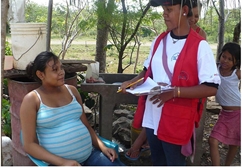
Celebrated each year during the first week of February, International Development Week was established by the Government of Canada to provide Canadian organizations - as well as individuals and those in the government - the chance to share their accomplishments and raise awareness of the challenges they face each year in the field.
The Canadian Red Cross is a non-profit organization that responds to the needs of people affected by adversity. By engaging in critical development work in regions impacted by emergencies and disasters around the world, the Canadian Red Cross is able to work toward targets etched out in the Millennium Development Goals by 2015.
In countries like Bolivia, Honduras and Nicaragua, the projects undertaken by the Canadian Red Cross have affected the lives of many people and provided much-needed resources to communities.
Bolivia
While Bolivia has made developments over the last 20 years, the country continues to struggle with health programs and has the second-highest maternal and infant mortality rate after Haiti. Chronic malnutrition impacts more than one in three Bolivian children, while limited access to clean water, sanitation and food contributes to the proliferation of the condition among those in the country.
The Canadian Red Cross provided an essential layer of support to the Bolivian Red Cross in the development of the Maternal and Child Health and Nutrition First project, which works to improve the health and nutritional wellness of children under the age of five, and especially children under the age of two.
Honduras
In Honduras, the health and welfare of women and children living in rural communities is a world health issue that organizations like the Canadian Red Cross work to address.
For women who don't live in urban areas, the lack of available health services and educational materials makes them less likely to seek out medical care during pregnancy and labor, which increases the risk of mortality.
Since 2006, the Canadian Red Cross has partnered with the Honduran Red Cross, Honduran Ministry of Health and municipal organizations to improve education and access to health services for families living in remote regions of the country through the REDES Project. With the REDES project, the organizations aim to reduce the rates of child mortality and enhance maternal health.
Nicaragua
In Nicaragua - which has an annual per capita income of $2,790, according to the World Health Organization, and is one of the poorest countries in the Americas - maternal and child mortality due to preventable health issues, like diarrhea, respiratory infections or malnutrition, are common.
By broadening access to health services and education, the risks that women and children living in remote areas face can be reduced. Since 2006, the Canadian Red Cross has worked with the Nicaraguan Red Cross to improve mother, newborn and child health through project ENLACE, which endeavors to reduce health inequities in 224 rural communities in the country's remote regions.
Show your support
The Canadian Red Cross strives to help those in need around the world. Through a variety of world health programs, the Canadian Red Cross is able to respond to humanitarian issues that emerge in countries like Bolivia, Honduras and Nicaragua.
With the help of Canadians like you, the Canadian Red Cross can continue its important work both domestically and abroad.
To show your support for the Canadian Red Cross and to make a difference today, please donate online or visit your local Canadian Red Cross office to learn more.